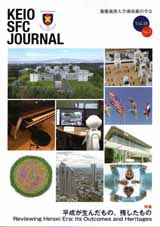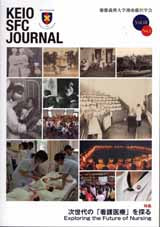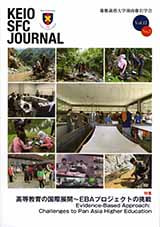- HOME
- KEIO SFC JOURNAL
- Vol.18 No.1

KEIO SFC JOURNAL Vol.18 No.1 Reviewing Heisei Era: Its Outcomes and Heritages
published on
Reviewing Heisei Era: Its Outcomes and Heritages
-
Foreword
Download this article (PDF): SFCJ18-1-00.pdfYuichiro Shimizu Professor, Faculty of Policy Management, Keio University)
-
"Reviewing Heisei Era: Its Outcomes and Heritages"
Eiji Oguma Professor, Faculty of Policy Management, Keio University Masahiro Kotosaka Associate Professor, Faculty of Policy Management, Keio University Yasuhiro Naito Associate Professor, Faculty of Environment and Information Studies, Keio University Shinya Fujii Assistant Professor, Faculty of Environment and Information Studies, Keio University Daijiro Mizuno Associate Professor, Faculty of Environment and Information Studies, Keio University Yuichiro Shimizu Professor, Faculty of Policy Management, Keio University
-
Review and Prospect of Heisei Reforms of Governance System
Koji Matsui Professor, Faculty of Policy Management, Keio University In this paper, I review how the 1955 system of the Japanese politics characterized by the bottom-up and consensus method of vertically divided ministries has been changed by the political reforms of the Heisei era. Firstly, I examine the political and administrative reforms in the 90s. Secondly, I analyze Prime Minister Koizumi's reforms and DPJ's challenges for the governance reform in the 2000s. Thirdly, I look at how Abe Administration has strengthened its top management based upon the predecessors' reforms. Finally, the future issues are discussed after looking back on a number of efforts in the past three decades.
Download this article (PDF): SFCJ18-1-02.pdf -
In Search of Value in Japanese Diplomacy - Revisiting Value-oriented Diplomacy and the Arc of Freedom and Prosperity
Ken Jimbo Professor, Faculty of Policy Management, Keio University "Value-oriented Diplomacy" and the "Arc of Freedom and Prosperity", the major foreign policy concepts under the first Abe administration (Sep 2006Aug 2007), intended to add a new pillar in Japanese diplomacy. The value-driven approach was generated from three dimension of policy platforms; new logics for Japan's global engagement, dealing with the rise of China and Abe administration's domestic impulse to overcome the "post-war regime". The demise of "Value-oriented Diplomacy", coupled with the resignation of the Abe administration, reflected its dissociation with global trends and domestic contention over Japan's China policy.
Download this article (PDF): SFCJ18-1-03.pdf -
30 Years History of Japanese Civil Society - Transition of Nonprofit Organization
Gen Miyagaki Professor, Faculty of Policy Management, Keio University A lot of NPOs/NGOs have played roles in solving natural disasters, conflicts and social challenges for many years (almost 30 years since 1989, 25 years since 1995). This article discusses the transition of NPOs in Japan. The main point is the discovery of the continuity before/after the first year of volunteer and the qualitative modification after the first year. All the while the high awareness and the business intention to NPOs have been found among new generation in particular, the declining trend in the voluntary participation in NPOs has been found. The pursuing sustainability of NPOs would undermine the potential of participation, which could bring about the paradox.
Download this article (PDF): SFCJ18-1-04.pdf -
The Heisei Era for Japanese Entrepreneurs
Masahiro Kotosaka Associate Professor, Faculty of Policy Management, Keio University Daichi Inoue 4th, Faculty of Policy Management, Keio University Daiki Kumamoto 4th, Faculty of Policy Management, Keio University In the past 30 years of the Heisei era, there have been various incidents which affected corporate management in Japan. The economic bubble burst, Livedoor shock, Lehman shock, The Great East Japan Earthquake, and other incidents are examples of the unforeseeable disturbances. This affected the acquisition of funds, human resources, and sales channels for a company at their founding stage. However, under such circumstances, many startups were born from Japan, and their corporate activities have supported and become the base for the Japanese economy. In this paper, we focus on ICT startups in Japan to uncover the transition from the foundation environment in the Heisei era, and clarify the way management should respond and be supported through the change of society.
Download this article (PDF): SFCJ18-1-05.pdf -
Analysis on Participatory Design Research in Heisei Period - Examining the Correlation between Welfare Policy and the Changing Roles of Users in Participatory and Inclusive Design
Daijiro Mizuno Associate Professor, Faculty of Environment and Information Studies, Keio University Kae Hirose Master Program, Graduate School of Media and Governance, Keio University Hiromi Kimoto 4th, Faculty of Environment and Information Studies, Keio University Kenta Tanaka Master Program, Graduate School of Media and Governance, Keio University Looking at contemporary history of design research, it is evident that the subject of design is in transition from designers to users. This paper examines this transition in design research to understand how the correlation between welfare policy design and participatory/inclusive design. By examining the correlation between the two, this paper attempts to address the socio-technical shift of design research from design for people to design by people, empowering and advocating users to be actively involved in design coalition teams.
Download this article (PDF): SCJ1F8-1-06.pdf -
Interaction between Science and Technology during Exploration of Life
Yasuhiro Naito Associate Professor, Faculty of Environment and Information Studies, Keio University Unraveling scientific question is inseparably related with technology for measurements and control, and life science is no exception. Life scientists, who have acquired the guiding principles on evolution and heredity in the 19th century, have found that genetic information is stored in DNA in the mid-20th century. Life science aiming to elucidate life systems as molecular machines has rapidly developed since then. During the Heisei era, enormous biological information of molecular granularity has been accumulated along with drastic innovation of biotechnology. The big biological data may lead life science into a novel phase.
Download this article (PDF): SFCJ18-1-07.pdf -
The Heisei Era: The Encounter of Music and Neuroscience
Shinya Fujii Assistant Professor, Faculty of Environment and Information Studies, Keio University Here I call the Heisei Era as the encounter of music and neuroscience. Why neuromusic research has been developed rapidly during the Heisei Era? In this article, I review important research articles published in 1990s, 2000s, and 2010s including the topics of non-invasive neuroimaging technologies, the musician's brain, the international neuromusic congress, the International Laboratory for Brain, Music and Sound Research (BRAMS), motor control research on drummers and pianists in Japan, and recent neuromusic research on rhythm, beat, groove, and chills. At the end, I propose a direction for next neuromusic research.
Download this article (PDF): SFCJ18-1-08.pdf
-
Fascinated by Systems' Research - Back to the Origin and Go Further
Hideyuki Tokuda President, National Institute of Information and Communications Technology / Professor Emeritus, Keio University This paper describes the evolution of ICT based on my final lecture following the main topic of this Special Issue. In particular, we first divided the research and development of our systems into 3 eras : the student era (1964 - 1982), CMU era (1983 - 1993), and KEO-SFC era (1990 - 2017) and the system technologies that were involved in R & D and what we have learned are discussed. In addition, in the last section, we discussed the best way to proceed research and education in SFC.
Download this article (PDF): SFCJ18-1-09.pdf
-
A Study of a University Baseball Head Coach's Acquisition of Practical Knowledge
Takafumi Hayashi Doctoral Program, Graduate School of Media and Governance, Keio University The purpose of this study is to acquire practical knowledge about the university baseball head coach's decision-making for the game strategies and tactics, and present the knowledge acquisition process. In this study, the author's reflection and statistics were used to analyze the coach's decisions for the games that determined the league championship. The results indicated that it was essential to make thorough preparation beforehand for the coach so as to make proper decisions while under tight time constraint during a game. Baseball head coaches can gain considerable knowledge from their personal experiences; however, personal experiences are limited, and for this reason this study can help coaches learn beyond their personal experiences.
Download this article (PDF): SFCJ18-1-10.pdf -
"Ungoverned Spaces" around Libya and Possibilities of the "Hybrid Governance"
Amane Kobayashi Doctoral Program, Graduate School of Media and Governance, Keio University This research re-examines the governance in politically destabilized region focusing on the concept of "Ungoverned Spaces," the geographical spaces lacking effective state sovereignty and control. Analyzing the 2011 Libyan Civil War and destabilization of regional security and governance as a case, this research shows how the "Ungoverned Spaces" are created and maintained, and their impacts on the international politics and security. Based on these analyses, this research suggests the "Hybrid Governance," an alternative governance model involving non-state actors to maintain peace and security. Implementing the "Hybrid Governance" could prevent and mitigate armed conflicts or humanitarian crises, and re-stabilizing the "Ungoverned Spaces" in the Middle East and African countries.
Download this article (PDF): SFCJ18-1-11.pdf

